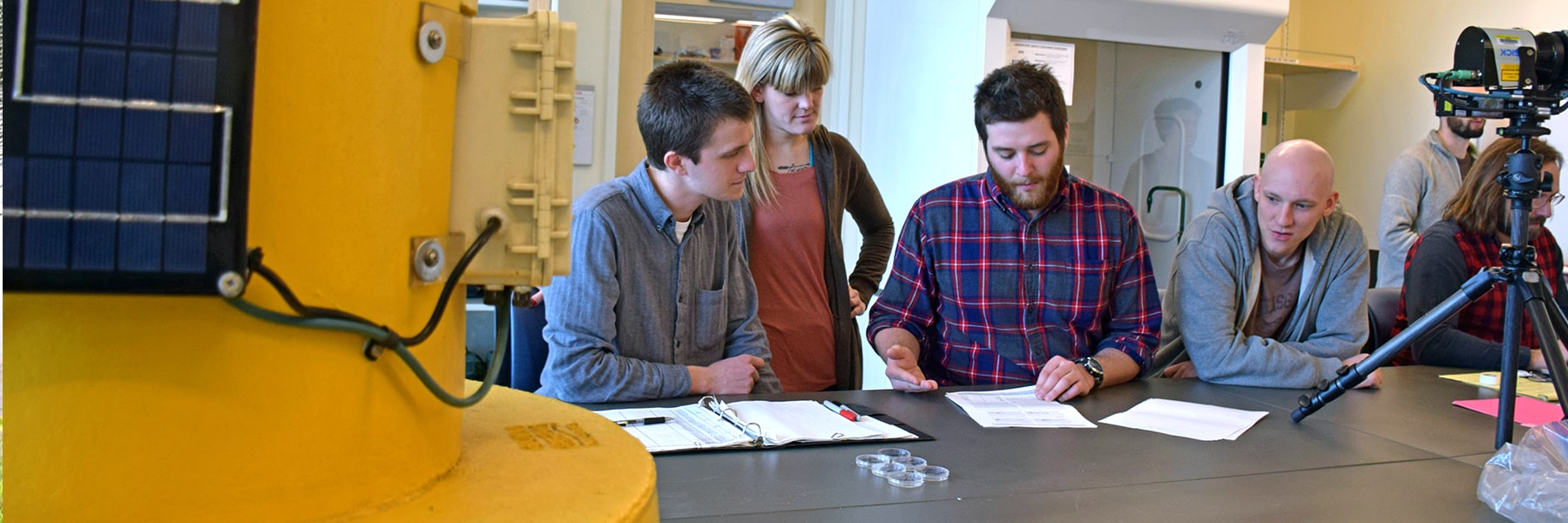Plan Your Education
How to Apply
Applicants must meet general graduate admission requirements in addition to the following program-specific requirements:
- Letters of Recommendation: 2
- Other: Faculty advisor commitment
Deadlines & Cost
Deadlines: February 15 for fall, November 1 for spring
Application Fee: The nonrefundable application fee is $75. UMass Boston alumni and current students that plan to complete degree requirements prior to graduate enrollment can submit the application without paying the application fee.
Program Cost Information: Bursar's website
Curriculum
Core Courses (8 Credits)
- ENVSCI 603 - Coasts and Communities I 4 Credit(s)
- ENVSCI 604 - Coasts and Communities II 4 Credit(s)
Skills Course (3 or 4 Credits)
Complete one from below.
Another course may be taken with approval of the student’s dissertation committee.
- ENVSCI 601 - Introduction to Probability and Applied Statistics 3 Credit(s)
- ENVSCI 611 - Applied Statistics 3 Credit(s)
Ethics Course (1 Credit)
- ENVSCI 600 - Responsible Conduct in Research 1 Credit(s)
School for the Environment Seminar (4 Credits)
All PhD students must attend seminar each week throughout their enrollment in the program but will receive no more than 4 credits for seminar.
- ENVSCI 791 - Seminar in Environmental Sciences 1 Credit(s)
Dissertation Research (18 Credits)
PhD students must complete 18 credits of dissertation research. More than 18 credits may be taken but only 18 will be applied to the degree.
- ENVSCI 899 - Dissertation Research 1-12 Credit(s)
Electives (25 or 26 Credits)
Complete 28 credits of additional courses and research hours in order to reach the 60 credits required for the program.
Students may select from any of the courses above not already taken or from 600-level or higher courses approved by their faculty mentor.
For more information on curriculum, including course descriptions and degree requirements, visit the Academic Catalog.
Learning Outcomes
Upon completion of the Environmental Sciences, PhD:
- Students will be able to apply the scientific method and design appropriate experiments to answer environmental science questions.
- Students will understand the contributions of laboratory, field, and survey data collection and analysis for approaching environmental science problems.
- Students will be able to analyze and critique environmental questions across multiple natural and social science perspectives and research approaches.
- Students will demonstrate analytical and quantitative proficiencies to analyze environmental and/or social science data.
- Students will understand the system interactions and feedback between human activities and social institutions and the natural environment.
- Students will be experienced in communicating their learnings both in writing, visually, and orally, and for specific and general audiences.
- Students will have gained confidence and been recognized as an expert in a their field by knowing the relevant literature, having conducted several pieces of original and significant research, presented this research publically, and have had this work reviewed by experts in their field.
Graduation Criteria
Complete at least 60 credits from 13 or more courses including two core courses, one skills course, one ethics course, one School for the Environment seminar, 18 credits of dissertation research, and 25 to 26 credits of electives.
Doctoral candidacy: Completion of written & oral qualifying exams by the end of the sixth semester. If the presentation and successful defense of the dissertation do not take place within five years of admission to candidacy, the candidate must repeat the comprehensive examination.
Dissertation: Compose and defend a dissertation based on original research.
En Route Master’s Degree: Students may, with the approval of the program director, apply to receive an MS degree en route to the PhD. To qualify, students must complete the core course requirements and comprehensive examinations.
Minimum grade: No courses with grade below B can be applied to the program. Students who earn B- in two courses will be considered no longer in good standing and may be dismissed from the program. Students who receive a grade below C in any graduate course will be dismissed from the program.
Grading basis: Courses must be taken graded unless the course is only offered on a satisfactory/unsatisfactory basis.
GPA: A minimum GPA of 3.0 is required from all courses applied toward the program.
Residency: Graduate course credits earned at another institution, as a non-degree student, or in another department may only be applied to the program with approval from the dissertation committee and graduate program director.
Course level: No more than one course taken at UMass Boston at the 300/400-level may be applied toward the program with approval of the thesis/project advisor and graduate program director.
Statute of limitations: Eight years.
Contact
Graduate Program Director Michael Tlusty
michael.tlusty [at] umb.edu
(617) 287-5285

School for the Environment
Learn more about the faculty, research, and programs that make up our School for the Environment.
Explore Now